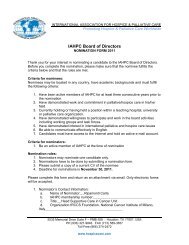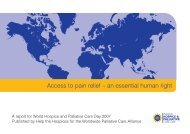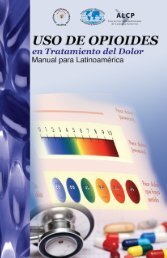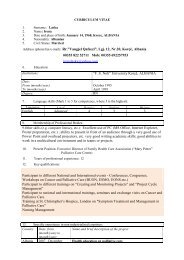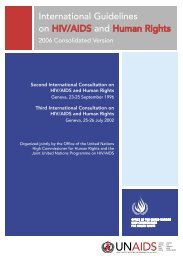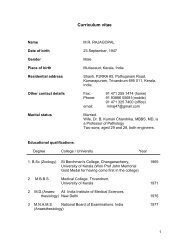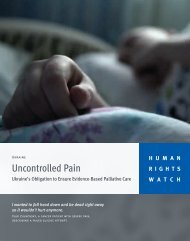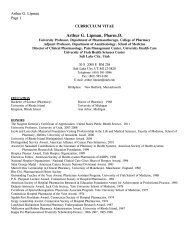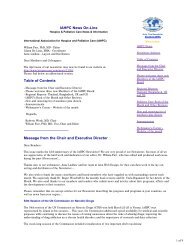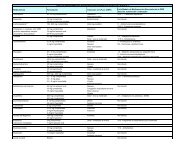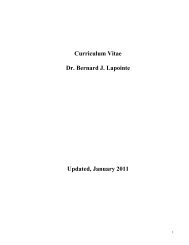INTERIGHTS Bulletin
INTERIGHTS Bulletin
INTERIGHTS Bulletin
Create successful ePaper yourself
Turn your PDF publications into a flip-book with our unique Google optimized e-Paper software.
<strong>INTERIGHTS</strong> <strong>Bulletin</strong><br />
Volume 16 Number 4 2011<br />
191<br />
prescribes OST, although coverage is<br />
low.<br />
In the Middle East and North Africa,<br />
six countries, including Iran, have<br />
needle and syringe programmes and<br />
three have OST, although none have<br />
responses sufficient to meet identified<br />
need. Across the region there is a low<br />
awareness of risks associated with<br />
injecting drug use. Few NGOs are<br />
working on harm reduction in the<br />
region, and in several countries<br />
restrictions on NGOs further limit the<br />
harm reduction response from civil<br />
society.<br />
Although data on drug use in the<br />
region are limited, injecting has been<br />
reported in 31 of 47 sub-Saharan<br />
African states. Where data are<br />
available, they suggest high HIV<br />
prevalence among people who inject<br />
drugs. A Kenyan study, for example,<br />
found that six of every seven female<br />
injectors were living with HIV.<br />
Responses to HIV in the region<br />
currently include little focus on people<br />
who inject drugs. Mauritius, where an<br />
estimated 17,000-18,000 people inject<br />
drugs, is the only country where needle<br />
and syringe programs are operating.<br />
It should be noted with some concern,<br />
that in international political forums,<br />
harm reduction has been weakened in<br />
the past year. At the General Assembly<br />
in the context of the 2011 political<br />
declaration on HIV/AIDS, harm<br />
reduction, previously seen as an<br />
obligation in declarations of 2001 and<br />
2006, was relegated to an optional<br />
consideration. 32 This is largely as a<br />
result of the weakening of the<br />
European Union on the issue, the<br />
unwillingness of many countries to<br />
expend political capital arguing about<br />
it and the staunch views of a handful of<br />
countries opposed to harm reduction.<br />
These include Russia, Iran, Egypt and<br />
the Holy See.<br />
Funding for harm reduction is very low<br />
globally and is neither representative<br />
of what is needed to address the HIV<br />
epidemic among injecting drug users,<br />
nor proportionate to injection-driven<br />
HIV transmission versus sexual<br />
transmission. Harm Reduction<br />
International estimates that just three<br />
US cents per day per injector is spent<br />
on HIV prevention in low and middle<br />
income countries. 33<br />
One of the most positive developments<br />
of recent years, however, has been the<br />
change in position of the US<br />
Government. From opposing and<br />
blocking resolutions at the UN<br />
Commission on Narcotic Drugs that<br />
referred to HIV prevention for<br />
injecting drug users and to human<br />
rights, the US has begun cosponsoring<br />
them. Even more<br />
importantly the US has lifted the ban<br />
on federal funding for needle and<br />
syringe programmes. At the time of<br />
writing, however, the President's<br />
Emergency Plan for AIDS Relief<br />
(PEPFAR) has yet to purchase any<br />
needles. That money, from the world’s<br />
largest donor to HIV/AIDS, would go a<br />
long way to improving the scale-up of<br />
harm reduction where it is most<br />
needed and realising the right to health<br />
of those affected. 34<br />
With this in mind, it is important to<br />
note that global funding for healthbased<br />
interventions related to drug use<br />
is vastly outstripped by the tens of<br />
billions of dollars spent annually on<br />
police, courts, prisons and military<br />
actions as part of law enforcement and<br />
other counter-narcotics initiatives. And<br />
it is in this context that many human<br />
rights abuses against people who use<br />
drugs and others are committed.<br />
Human Rights Abuses Against People<br />
Who Use Drugs in the Context of<br />
Health Care<br />
Criminal Laws and Policing<br />
In almost every country in the world,<br />
possession of drugs for personal<br />
consumption is a crime. In many, drug<br />
use itself is a crime. 35 The<br />
implications for those who have a<br />
dependency – a chronic, relapsing<br />
medical condition – are particularly<br />
serious. Individuals have a right to<br />
obtain lifesaving health services<br />
without fear of punishment or<br />
discrimination. In some countries,<br />
many people who inject drugs do not<br />
carry sterile syringes or other injecting<br />
equipment, even though it is legal to<br />
do so, because possession of such<br />
equipment can mark an individual as a<br />
drug user and expose him or her to<br />
punishment on other grounds. 36<br />
Many do not seek treatment or attend<br />
harm reduction services, again, for fear<br />
of arrest and conviction. 37<br />
Appropriate, human rights compliant<br />
policing is essential for effective drug<br />
policies and positive health outcomes<br />
for drug users. Unfortunately, in<br />
country after country, the experience is<br />
often the opposite, partly due to the<br />
poor laws being enforced and partly<br />
due to policing practices. In many<br />
places, police target drug users and<br />
harm reduction services, seeing easy<br />
opportunities to harass, entrap and<br />
extort clients – or simply to fill arrest<br />
targets. 38<br />
Police presence at or near harm<br />
reduction programmes drives people<br />
away from these services due to fear of<br />
arrest or other punishment. In<br />
Ukraine, for example, drug users have<br />
reported being arrested multiple times<br />
at legal needle exchange sites. 39<br />
Individuals have been severely beaten<br />
for possessing syringes at or near<br />
needle exchange points. 40 Withdrawal<br />
has been used as a means to extract<br />
evidence or to extort money once<br />
detained. 41<br />
In Georgia, drug crackdowns in 2007<br />
resulted in 4 per cent of the country’s<br />
male population being tested for<br />
drugs, many under forced conditions.<br />
Thirty-five per cent of these went on to<br />
be imprisoned on a drug-related<br />
charge. 42<br />
In Thailand, the 2003 ‘war on drugs’<br />
that resulted in more than 2,300<br />
extrajudicial killings has had a lasting<br />
impact on drug users’ access to<br />
fundamental health care services. 43<br />
Studies reported a significant decline<br />
in the number of people seeking<br />
treatment for drug use during the ‘war<br />
on drugs,’ and also reported that a<br />
significant percentage of people who<br />
had formerly attended drug treatment<br />
centres went into hiding. 44 Years later,<br />
many people who use drugs still



